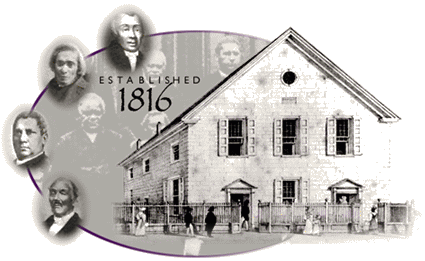
"A Church Without Walls"
St. John African Methodist Episcopal Church

Histroy of the AME Church
Richard Allen was born a slave on February 14, 1760, on the plantation of a Philadelphia lawyer named Benjamin Chew. Allen, his three siblings, and his parents were sold to Stokely Sturgis, a plantation owner in Delaware. After teaching himself to read and write, and with the permission of Sturgis, Allen began to attend Methodist meetings, and around 1777 he was converted to Methodism. In the second half of the eighteenth century, Methodism proliferated in Delaware, Pennsylvania, and Maryland.

This Christian denomination emphasized a simple set of virtues that included honesty, modesty, and sobriety. In 1780 Sturgis agreed to let Allen hire himself out in order to earn money to purchase his freedom for $2,000.00. In pursuit of this goal, Richard held a variety of odd jobs, continued his ministry and began to preach at Methodist churches in Delaware and neighboring states; and converted his owner to the Methodist faith. In 1783, Richard bought his and his brother’s freedom.
After purchasing his freedom, Allen moved back to Philadelphia, where he established himself as a minister. He preached throughout Philadelphia, New Jersey and Delaware.
Allen accepted an invitation to preach at St. George’s Church in Philadelphia, a mixed race congregation of Methodists. Within a short time, Allen dramatically increased St. George’s black membership, and the building could no longer accommodate the growing congregation. White elders at St. George rejected Allen’s request for a separate place of worship for African American members and chose instead to construct separated seating within the church by installing a balcony. Allen was discouraged by the fact that the black worshippers who had helped construct the balcony would be relegated to sitting there. It was during this time that Allen met his future associate, Absalom Jones.
In 1787, while kneeling in prayer at St. George’s Methodist Episcopal Church, Allen looked up to find a church trustee trying to wrench Absalom Jones to his feet. The devout Jones replied, “Wait until the prayer is over, and I will get up and trouble you no more.” Then another trustee came and tried to pull William White from his knees. As a result of this action, Allen and Jones organized, on April 12, 1787, the independent Free African Society. An organization dedicated to serving all humanity which denounced slavery, and spearheaded the establishment of an “African Church”.
In 1797, Allen established what was known as the Blacksmith Shop Meeting House when he purchased an abandoned blacksmith shop from a man named Sims and moved it to a plot of ground on 6th Street between Lombard and Pine Streets. This building was dedicated as a church in 1794 by Bishop Francis A. Asbury of the Methodist Episcopal Church.
From July 1805, Allen conducted services in the “Roughcast Church”. This had been the first brick church erected on American soil by people of color. The African Methodist Episcopal denomination was organized in Philadelphia in 1816. Richard Allen was consecrated as its first Bishop at the General Conference in Philadelphia, Pennsylvania, April 10, 1816. In 1841 the red brick church was built to replace the old roughcast one, and remained in use until the present church (dedicated in 1890) was erected in its place on the original plot of ground.
Because of the Methodists’ discriminatory treatment of blacks, the church was consecrated as part of the Protestant Episcopal Church and Jones became the denomination’s first black priest. Allen, however, remained faithful to Methodism and used his own savings to buy a former blacksmith’s shop and transplant it onto a plot of land he had previously purchased in Philadelphia. After renovations, Bethel African Church opened on April 9, 1794, and Allen was ordained its deacon. After Bethel was officially initiated at the 1796 Methodist conference, white Methodist officials attempted to gain control over Allen’s church, but a Pennsylvania Supreme court ruling in 1807 declared that the black Methodist congregation owned the property on which they worshipped and that they could determine who would preach there.
Following Allen’s example, many black Methodists formed African Methodist Churches in northeastern cities. Because all experienced similar challenges from white Methodists, Allen organized a convention of black Methodists in 1816 to address their shared problems. The leaders decided to unite their churches under the name of the African Methodist Episcopal (AME) Church. Accordingly, they gained control over the governance of their churches and placed themselves beyond their ecclesiastical jurisdiction. Attendants elected Allen bishop of the new denomination, a position he held until his death in 1831.
The AME Church immediately became a center of black institutional life. As its leader, Allen created the Bethel Benevolent Society and the African Society for the Education of Youth. He also published articles in Freedom’s Journal attacking slavery and organizations such as the American Colonization Society. Because Allen believed enslaved and free black Americans could be best served through education and religious instruction, he opposed organizations that advocated the migration of black Americans to Africa.
From 1797 to his death on March 26, 1831, Allen operated a station on the Underground Railway for escaping slaves. This work was continued by Bethel Church until the Emancipation.
Bishop Allen was married to Sarah Bass Allen. He was the father of six children: Richard Jr., James, John, Peter, Sarah, and Ann.
Church School
Sundays at 9am
Services
Sundays at 10am
7700 Crosswoods Dr
Columbus, Ohio 43235
Bible Study
Wednesdays at 7:00 PM.
**Any additional services will be announced during worship service.**